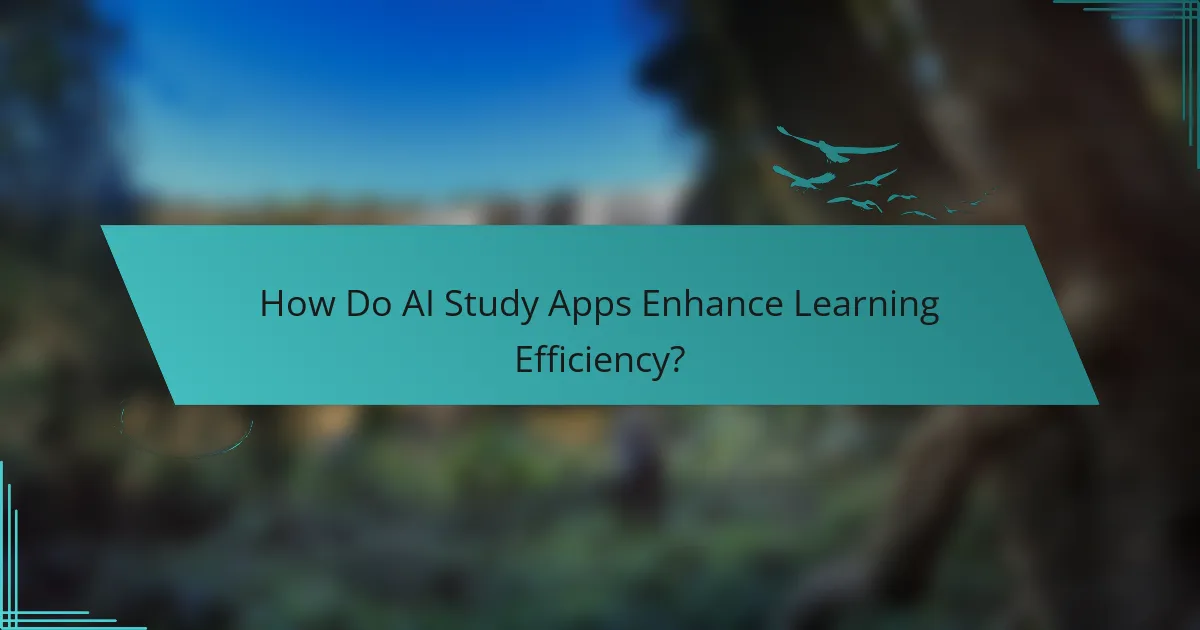AI study apps are transforming lifelong learning by offering personalized educational experiences tailored to individual needs and preferences. These innovative tools not only enhance learning efficiency through interactive content but also come with varying costs that must be considered when evaluating their overall value. By understanding the balance between cost and benefit, learners can make informed decisions about incorporating these resources into their educational journeys.

What Are the Best AI Study Apps for Lifelong Learning?
The best AI study apps for lifelong learning include tools that enhance your educational experience through personalized learning paths and interactive content. These applications cater to various subjects and learning styles, making them valuable resources for anyone looking to expand their knowledge.
Duolingo
Duolingo is a popular language-learning app that uses AI to tailor lessons to individual users’ progress and proficiency. It offers a gamified experience, making learning engaging through rewards and challenges.
Consider using Duolingo if you’re starting a new language or want to practice conversational skills. The app is free with optional premium features, making it accessible for most learners.
Khan Academy
Khan Academy provides a wide range of free educational resources, including video lessons and practice exercises across various subjects. Its AI-driven recommendations help users focus on areas where they need improvement.
This platform is ideal for students of all ages, from elementary school to college. The content is entirely free, making it a cost-effective option for lifelong learners.
Coursera
Coursera partners with universities and organizations to offer online courses that often include AI-enhanced features like personalized learning pathways and assessments. Users can earn certificates or even degrees in various fields.
While many courses are free to audit, obtaining a certificate typically requires a fee, which can range from a few tens to several hundred dollars. Consider Coursera if you’re looking for structured learning from reputable institutions.
Quizlet
Quizlet uses AI to create personalized study tools, including flashcards and quizzes, based on user performance. This app is particularly useful for memorization and review across a wide range of subjects.
It offers both free and premium versions, with the premium version providing additional features like advanced learning statistics. Quizlet is great for students who need to reinforce their knowledge through repetition.
Edmodo
Edmodo is an educational platform that connects students and teachers, facilitating collaborative learning through AI-driven insights. It allows for resource sharing, discussions, and assessments in a secure environment.
This app is particularly beneficial for classroom settings but can also be used for individual learning. Edmodo is free for basic use, making it accessible for both educators and learners looking to enhance their educational experience.

How Do AI Study Apps Enhance Learning Efficiency?
AI study apps enhance learning efficiency by providing tailored educational experiences that adapt to individual needs and preferences. These applications leverage advanced algorithms to optimize study routines, making learning more effective and engaging.
Personalized Learning Paths
Personalized learning paths allow users to follow a customized curriculum based on their unique strengths and weaknesses. By assessing initial knowledge levels, AI study apps can create a roadmap that prioritizes topics requiring more focus, ensuring efficient use of study time.
For example, if a student struggles with math concepts but excels in language arts, the app will allocate more resources and time to math, adjusting as the learner progresses. This targeted approach helps maintain motivation and reduces frustration.
Real-time Feedback
Real-time feedback is a crucial feature of AI study apps, providing immediate insights into performance. Users receive instant assessments on quizzes and exercises, allowing them to identify mistakes and understand concepts better as they study.
This immediate response can significantly enhance learning retention. For instance, if a user answers a question incorrectly, the app can offer explanations or additional practice problems right away, reinforcing the learning material effectively.
Adaptive Learning Techniques
Adaptive learning techniques adjust the difficulty of tasks based on user performance, ensuring that learners are consistently challenged without becoming overwhelmed. These techniques analyze user interactions and modify content dynamically to match their evolving skill levels.
For instance, if a learner consistently answers questions correctly, the app may introduce more complex problems to stimulate growth. Conversely, if a user struggles, the app can revert to simpler concepts, providing a balanced learning experience that promotes confidence and mastery.

What Are the Costs Associated with AI Study Apps?
The costs associated with AI study apps can vary significantly based on features and usage. Understanding these costs is essential for evaluating their overall value for lifelong learning.
Subscription Fees
Many AI study apps operate on a subscription model, charging users monthly or annually. Subscription fees can range from a few dollars to over a hundred dollars per year, depending on the app’s functionalities and the depth of content offered.
When considering subscription fees, evaluate what features are included. Some apps may offer a basic version for free, while advanced features, such as personalized learning paths or premium content, may require a higher-tier subscription.
In-app Purchases
In-app purchases are additional costs that users may incur while using AI study apps. These purchases can include extra resources, specialized courses, or enhanced functionality, often priced individually.
Be cautious with in-app purchases, as they can quickly add up. It’s wise to assess whether the additional content justifies the cost and if it aligns with your learning goals.
Free vs. Paid Features
Most AI study apps offer a mix of free and paid features, which can impact your learning experience. Free versions may provide basic functionalities, while paid versions typically unlock advanced tools and resources.
When choosing between free and paid features, consider your learning needs. If the free version meets your requirements, it may be sufficient. However, if you’re seeking personalized feedback or extensive resources, investing in the paid version could be worthwhile.

What Are the Benefits of Using AI Study Apps?
AI study apps offer personalized learning experiences that can significantly enhance the effectiveness of lifelong education. By leveraging advanced algorithms, these applications adapt to individual learning styles and paces, making study sessions more efficient and engaging.
Accessibility and Convenience
AI study apps provide easy access to educational resources anytime and anywhere, breaking down traditional barriers to learning. Users can study on their smartphones or tablets, allowing for flexible learning schedules that fit into busy lifestyles.
This convenience is particularly beneficial for those balancing work, family, and education. With offline capabilities, learners can download materials and continue their studies without needing a constant internet connection.
Engagement and Motivation
AI study apps often incorporate gamification elements, such as quizzes and rewards, to keep users engaged. This interactive approach not only makes learning enjoyable but also motivates users to complete their study goals.
Additionally, personalized feedback and progress tracking help learners stay accountable. By visualizing their achievements, users are more likely to remain committed to their educational journey.
Resource Variety
These applications typically offer a diverse range of study materials, including videos, articles, and practice exercises. This variety caters to different learning preferences, ensuring that users can find resources that resonate with them.
Moreover, many AI study apps continuously update their content, providing access to the latest information and trends in various fields. This ensures that learners are not only studying effectively but also staying current in their knowledge.

How to Evaluate Cost vs. Benefit of AI Study Apps?
To evaluate the cost versus benefit of AI study apps, consider both the financial investment and the educational value they provide. Assessing features, user experiences, and trial options can help determine if an app meets your learning goals effectively.
Cost-Benefit Analysis Framework
A cost-benefit analysis framework helps you systematically compare the expenses of AI study apps against their potential benefits. Start by listing all costs, including subscription fees, in-app purchases, and any additional resources needed. Then, identify the benefits such as improved learning outcomes, time savings, and enhanced engagement.
Consider using a simple table to weigh these factors. For example, if an app costs $10 per month but significantly boosts your study efficiency, the investment may be justified. Aim for a balance where the benefits clearly outweigh the costs.
User Reviews and Ratings
User reviews and ratings provide valuable insights into the effectiveness of AI study apps. Look for platforms that aggregate user feedback, such as app stores or educational forums. High ratings often indicate a positive user experience, while detailed reviews can highlight specific strengths and weaknesses.
Pay attention to comments regarding usability, content quality, and customer support. A well-reviewed app with a strong community can enhance your learning experience and provide additional resources through peer interactions.
Trial Periods and Demos
Many AI study apps offer trial periods or demos, allowing you to explore their features without financial commitment. Take advantage of these options to assess the app’s functionality and compatibility with your learning style. A trial can reveal whether the app’s tools genuinely enhance your study habits.
During the trial, focus on key aspects such as ease of navigation, content relevance, and the effectiveness of AI-driven features. If possible, compare multiple apps during their trial phases to make a more informed decision on which one best meets your educational needs.
